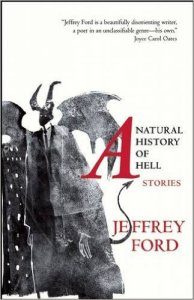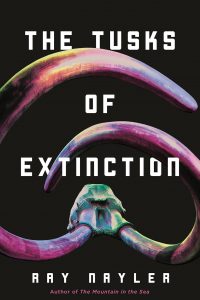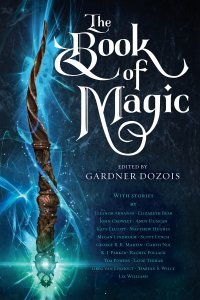Paul Di Filippo reviews Jeffrey Ford
A Natural History of Hell, by Jeffrey Ford ((Small Beer Press 978-1-61873-118-0, $16, 256pp, trade paperback) July 2016
 Some fifteen years ago, on this very website, noted critic and editor Nick Gevers offered a list titled The Best SF and Fantasy Short Story Writers: A Contemporary Top Ten. His choices were a catalogue of top-notch fantasists—Shepard, Wolfe, et al—and I found myself astonished, humbled and flattered to be included. I like to imagine that perhaps my subsequent work continued to justify such an honor.
Some fifteen years ago, on this very website, noted critic and editor Nick Gevers offered a list titled The Best SF and Fantasy Short Story Writers: A Contemporary Top Ten. His choices were a catalogue of top-notch fantasists—Shepard, Wolfe, et al—and I found myself astonished, humbled and flattered to be included. I like to imagine that perhaps my subsequent work continued to justify such an honor.
But we are not here today, of course, to talk about me. We are here to ponder what names might be on such a list newly composed in 2016. (Your suggestions in the comments most welcome.)
I would like to nominate Jeff Ford for a slot. I think it’s undeniable that his unique voice and sensibilities demonstrate the best of what our genre can do. Any new collection from him, surfacing at slow, deliberate, but not too leisurely intervals, is always an occasion for joy, and an ongoing demonstration of his prowess and the possibilities inherent in fantastika.
Let’s take a look at his newest volume, and see if we can discern what makes his work so wonderful and exemplary.
“The Blameless” is the only story original to this assemblage. It starts out all domestic quotidianness, like something out of The New Yorker, then, just a bit further down the first page, swerves into the uncanny. It appears that suburban families are now hosting exorcism parties for their wayward children. Our husband and wife viewpoint characters, a kind of lovingly squabbling Nick and Nora, attend one such party with dramatic and unforeseen results. Here we see Ford’s salient black humor at play, as well as his ability to blend mimesis and the supernatural in seamless fashion. George Saunders would have been proud to write this one.
According to all the academic technics of “good storytelling,” “Word Doll” really shouldn’t work, since it’s all second-hand recounting of some weird Golden Bough-style folklore. But thanks to the empathetic viewpoint character (who happens to be a writer named “Jeff Ford”) and the fascinating invented rituals, as well as a good portrayal of the guardian of this lore who is telling the story, the whole tale becomes mesmerizing and highly satisfactory. I think it illuminates how Ford has learned from older narrative forms, such as Lovecraftian “histories,” and is willing to experiment with “tell, don’t show” as an alternative to current narrative orthodoxies.
If both of these first two tales walked a borderline between fantasy and horror, “The Angel Seems” plunges fully over that border into pure horror. A small village is beset by the depredations of the aforementioned supernatural being named “Seems.” Ford’s fecund imagination provides a vast array of archetypical, Mignola-level terrors, body-related and otherwise, and the ending is suspenseful, heroic and unpredictable.
Fans of the oddball family dynamics in Ford’s fabulous novel, The Shadow Year, will find some of the same allure in “Mount Chary Galore,” along with a Manly Wade Wellman rustic-eeriness vibe. Three kids become involved with the totemic witchy figure of Mrs. Oftshaw, purveyor of the fabled healing goop referenced in the title, and they find her grasp extending into their own domestic affairs.
Channeling Haruki Murakami and maybe some 1960s Japanese social-realist cinema, “A Natural History of Autumn” finds a man and woman, newly acquainted, at a strange country cottage where otherworldly beings reign. Their escape scene from the lair is protractedly pulse-pounding.
Black satire, but never bludgeoningly obvious, dominates “Blood Drive,” about a day not far from our present—perhaps along lateral dimensions—where packing firepower is the birthright of every citizen from age twelve upward, and high-school life is, as you might expect, rather more fraught with danger and anxiety than we currently experience.
Emily Dickinson, deeply limned, undergoes some uncharacteristic adventures outside the confines of her Amherst home in “A Terror,” which find her serving as a nanny and employing her verses as talismanic weapons. Ford captures the rhythms and attitudes of her Victorian times in a manner that is simultaneously vintage and eternal.
“Rocket Ship to Hell” reads like a collaboration among Barry Malzberg, William Barton and Howard Waldrop. Taking a break from the rigors of the World SF Convention in Philly, our author hero has a bar-room encounter with an older writer who shares with him a long anecdote about the strange intersection between SF and a quartet of eccentric, space-travel-loving millionaire fans.
Ford’s wild-eyed version of steampunk, “The Fairy Enterprise,” is like no other, involving a crude, megalomaniacal entrepreneur named Bennett and his desire to create a fairy factory, along the following lines:
The libban are gathered up at the top of the silo and then pushed through a tube into a chamber where they are blasted with the powdered dirt of the earth. This mix of spirit and dust is then spewed out across the fruiting vats of the factory, wherein will grow large, globe-headed mushrooms. When they succeed to a certain plumpness, these fungi will burst and fairies will be born.
Bennett’s greed and unethical ways receive a fitting comeuppance.
“The Last Triangle” might have flowed from the pens of Tim Powers or James Blaylock, while yet being unmistakably Fordian. Our junkie narrator, wholly convincing in his self-deprecating trough of despair, is adopted out of sheer compassion by an elderly woman who thereupon turns out to be involved in mystical shenanigans. The relationship between the pair is positively Sturgeonesque, and the mysteries of the rituals are startling and fresh.
A kind of swashbuckling tale that reminded me in a way of Crouching Tiger, Hidden Dragon, despite lack of any obvious Asian themes, “Spirits of Salt: A Tale of the Coral Heart” is a kind of sophisticated hybrid of Fritz Leiber, Clark Ashton Smith and Robert E. Howard. Our daring swordsman hero, possessed of a magical blade, finds himself going up against an implacable foe of equal power. The hidden forces behind the assault prove shockingly intimate.
Surely “The Thyme Fiend” will enter the annals of essential, classic ghost stories. Rich with the hot, dusty evocations of a simpler, yet no less demanding era—small-town USA circa 1915, quasi-Bradburian—the tale involves the titular lad, subject to painful visions that only ingestion of the herb thyme can alleviate, and the ghost of “Jimmy Tooth,” who seeks vengeance for his murder.
Finally, we encounter this startling injunction: “I want you to go forth in the world, find the Devil, and paint his portrait.” Such is “The Prelate’s Commission,” given to the artist Talejui. The task proves infinitely recondite, and does not end well for any of the parties.
Having surveyed and relished the contents of A Natural History of Hell, what can we adduce as Ford’s distinctions? A highly controlled mutable style and love of language, which can accommodate the first-person narration of a modern-day drug addict as easily as it contours to the omniscient attention given to a youth of the early twentieth century. Then there’s the originality and startling novelty of his conceits, no rehashed tropes or clichés, but new ideas and symbols which nonetheless tap into primordial wells of human feeling and thought. Ford possesses both a sense of ethics and outrage at the affronts of existence and also a fount of cosmic humor, each of which balances the other perfectly. Finally, the reader feels that this writer is fully invested in each tale, inhabiting his varied subcreations as a demiurge inhabits his children of clay, animating his characters with his own lifeforce, not slighting or only half-believing in them, but rather endorsing the reality of all their actions, even while from a larger perspective they might be doing wrong.
These traits, combined with sheer native talent, are what make a truly outstanding writer, a level at which Jeff Ford comfortably and indubitably perches.







